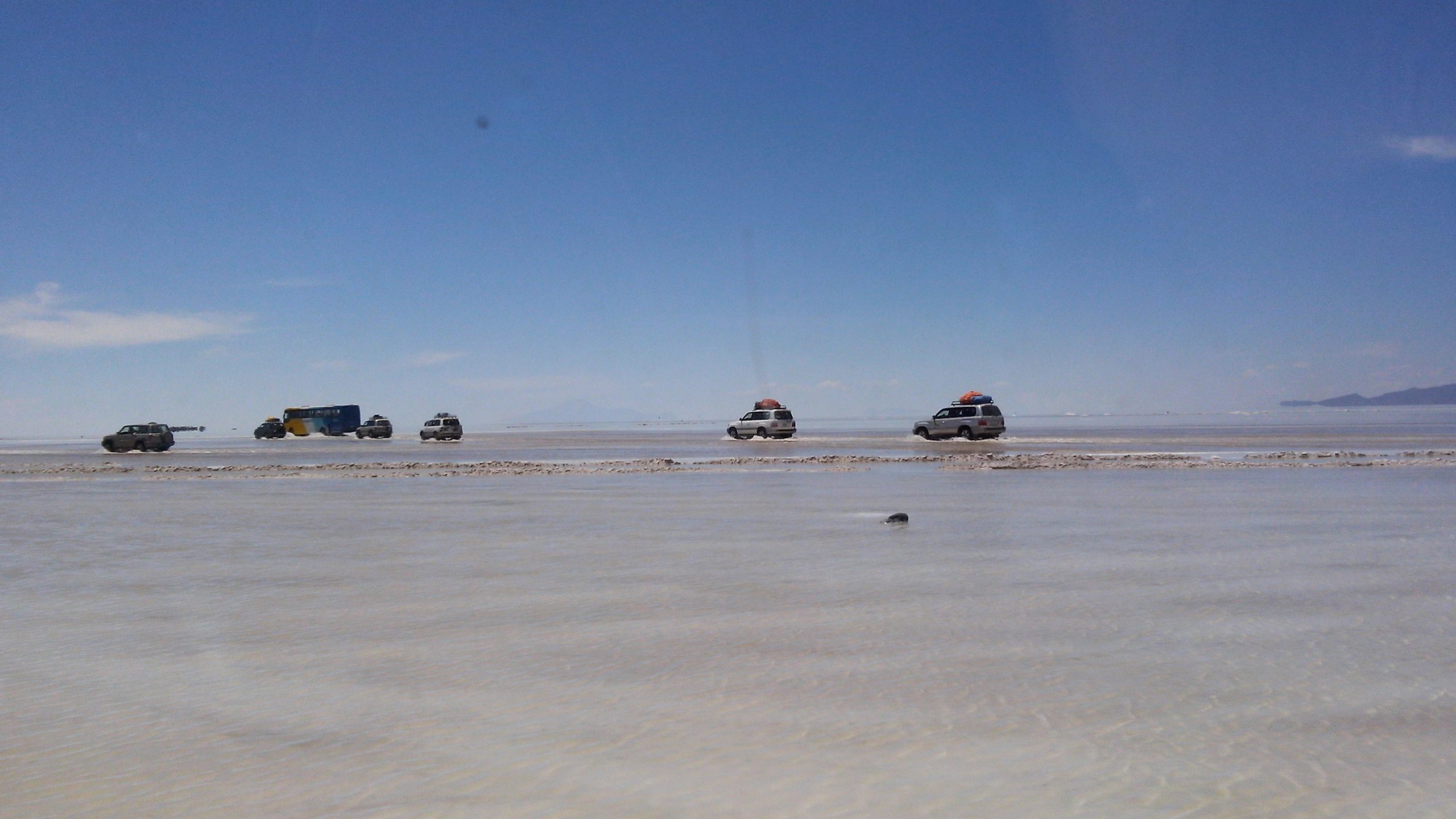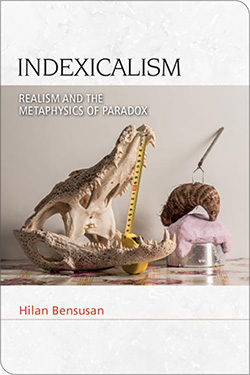
Graham Harman and Hilan Bensusan
Graham Harman: Your new book Indexicalism has already created a lot of excitement, including a wonderful online book launch conference, the likes of which I have never seen before[i]. Could you start by explaining to a newcomer what “indexicalism” means?
Hilan Bensusan: Indexicalism is the idea that the world is ultimately best described in terms of indexical expressions like ‘here’, ‘you’, ‘now’, ‘outside’, ‘same’ or ‘other’. Substantive descriptions like ‘water’, ‘trees’, ‘the planet Venus’, ‘the year 2021’ or ‘the German population’ are appropriate to think things through only to the extent that they harbor implicit indexicality – this is to say, they abbreviate indexical expressions, like ‘that drinkable stuff that fills this and that lake and this and that bottle’, ‘those green things on the surface of this planet’, ‘the morning star and the evening star’, ‘this year’ or ‘those who live between this and that borders’. Indexical expressions provoke vertigo because they are thoroughly situated; to claim that they are what best does justice to the furniture of the universe is to be on the verge of paradoxes related to ideas of a general view or of totality that are commonplace in metaphysics. As a metaphysics, indexicalism is, therefore, a strange, non-standard one – it is paradoxical because it can also be seen as a critique of metaphysics if metaphysics aims at a general, substantive view of how things are. It yields a situated metaphysics where the position one is in cannot be disregarded or thrown out of the picture.
In general, our talk about things assumes that they can be made known or understandable no matter where one is. It is as if they can be made transparent from any perspective which often amounts to holding that they are viewed from nowhere. In contrast, we often hear the idea that truth about things is relative to beliefs, concepts, vocabularies or states of mind of the beholder. Indexicalism departs from both approaches: things cannot be viewed from nowhere – because they are situated – and they are not subjective. Rather, they are positioned and can be viewed only from a point of view. Still, that point of view is precisely what affords elements like ‘outside’ or ‘other’; there is always an ‘exterior’ to a point of view shaped by indexicals. The exterior is what lies outside the scope of a situated account of what there is. This outdoors is fully indexical and, as such, transcends the positioned description that can be provided to anything. According to indexicalism, no (situated) account can be entirely immune to this outdoors.

Indexicalism bites the bullet of a paradoxical view – indeed it is a paradoxico-metaphysics in the sense developed by Jon Cogburn – because it addresses the other as other[ii]. In other words, the price in paradox is paid because it is a way to make sure that the right to opacity of the other is not going to be trespassed by the effort to make everything fully transparent. To take seriously the others –an effort that was championed by Emmanuel Levinas’ departure from Edmund Husserl’s (monadological) approach to the other as an alter ego, as a ‘me’ who is somewhere else– is to understand that the effort to know things is intrinsically bound by the responsibilities they command[iii]. This boundedness emerges from the very nature of the other as other. To describe the world as having others (and an outside, exterior, etc.) is to admit opacity into the picture of how are things in general: the effort of making things transparent is bounded when others as others appear in the picture. Indexicalism thus entails a ‘metaphysics of the others’ that expands the gesture of Levinas beyond the limits of the human other.
The metaphysics of the others hold that any metaphysical endeavor ought to tackle the opacity that appears when a general view of things is pursued. In that sense, it is similar to your [Graham Harman’s] object-oriented ontology[iv]. There too, there is a real object that is intrinsically withdrawn, oblivious to view. Indexicalism and the metaphysics of the others postulate that this blind spot is not inside things but outside them, in what is other to them and escapes them. Still, the similarities are interesting to explore, and some of them are considered in the book. The most striking one for me is that in both cases metaphysics –and, consequently, any enterprise to make things transparent– encounters its limits from within.
Graham Harman: In some sense, your book is an attempt to bring together the cosmological impulses of Alfred North Whitehead with the ethical focus of Emmanuel Levinas. I would like to ask about both of them. Whitehead is one of the most imaginative metaphysicians of all time, yet A.W. Moore’s fine 2014 book The Evolution of Modern Metaphysics –which does such a fine job of including both analytic and continental figures– does not even include a chapter on Whitehead[v]. What do you make of this?
Hilan Bensusan: Yes, the book can be understood as a way to bring Whitehead and Levinas together. Whitehead’s philosophy is full of fruitful ideas and refreshing approaches and in this sense is a source for a lot of what is happening in many corners of contemporary thought[vi]. I often make the same remark about Moore’s book: not a single mention of Whitehead apart from a reference to Russell and Whitehead’s Principia in a footnote. Interestingly, the footnote is in a chapter on Gilles Deleuze which is called “something completely different.” And, well, I consider that Deleuze, original and inspiring though he is, wouldn’t sound so utterly different if we took into account how much he inherited from Whitehead. I consider Whitehead, indeed, as a central source for Deleuze’s projects –from transcendental empiricism to the concreteness of becomings– even if Deleuze doesn’t acknowledge this often enough. Moore perhaps thinks it is enough to cover Henri Bergson, who is also a great influence on Deleuze. But it seems to me that there is too much left in the mist in Deleuze if his affiliation to ideas rehearsed by Whitehead is not brought to the fore. (Incidentally, Levinas is also only mentioned in Moore’s book in a footnote, in the chapter about Derrida– who I also think it is hard to understand if his connection to Levinas is not explored.)
Drawing on Levinas and Whitehead –and indirectly on Derrida and Deleuze– Indexicalism is an attempt to find a transcendence that is not attached to hierarchical thinking in an overall immanent image of the world that could be expressed in terms of what Whitehead calls process. The fertility of Whitehead’s philosophy is such that it can be suitably adapted to provide a framework for what I call the metaphysics of the others. Some of his notions are crucial for the reading of Levinas that I rehearse, as it enables a fierce rejection of different forms of human exceptionalism. In a sense, Whitehead provides an account of experience –connected to his idea that perception is ubiquitous and more so than relations– that suits the expansion of Levinas’ ideas that Indexicalism aims to offer. The phenomenology of encountering others can be placed in a context where interruption is understood as a break in one’s concrescence or one’s nexus: a break that Whitehead’s commitment to immanence is arguably unable to postulate. The metaphysics of the others claims that any agenda is hostage to a transcending outdoors that cannot be fully encompassed by a more overarching nexus.
Among the central Whiteheadian notions that are at play in Indexicalism, two are worth mentioning. The first is that of locus standi, or standing location. Whitehead claims that any measurement is relative to a standing location: it is only from one’s location that it becomes clear how best to measure anything. Measurement is not location-independent but is not a mere convention either. I believe many of our judgments on how things are –including the validity of arguments– can be approached in terms of measurement and, as a consequence, are relative not to any arbitrary or subjective decision, but to a standing location. The move is not alien to what Karen Barad recommends in her attempts to bring back elements of Niels Bohr’s approach to measuring instruments[vii]. Barad also makes clear that measurement is neither a sovereign construction nor something that can be done from nowhere. This idea of a standing location is a crucial ingredient of the indexicalist mix.
The second notion is that of importance, which is itself attached to that of a lure for feeling. Experience is intrinsically connected to importance, to what matters for the perceiving agent: according to Whitehead this is what makes an isolated, non-coordinated fact impossible to be perceived or understood,. Yet, the matrix of importance changes. Theories, films, dialogues pave the way to feelings that weren’t there before, precisely because they affect the matrix of what matters and what doesn’t. The book proposes a concept of perception as hospitality that perhaps couldn’t get off the ground without the idea that sensibilia are themselves modulated by what is encountered. These two notions –those of locus standi and of importance– illustrate how fertile Whitehead’s philosophical toolbox is. Indexicalism employs them to advance a project that is, in some sense, quite different from that of Whitehead himself.
To be continued…
Part 2 available now!
Get your copy of Indexicalism here
Proposes a radical new metaphysics where reality is not substantive but is indexical
- Puts forward a new theory of metaphysics where the furniture of the universe is deictic and substantives are conceived as thoroughly situate
- Extends the idea of metaphysics as transcendence, proposed by Levinas, to a process philosophy where the Other is not only human but ultimately the Great Outdoors
- Presents an approach to perception that makes it close to a conversation which portrays conceptual mediation as a special case of the Whiteheadian notion of importance
About the speakers…
Graham Harman is Distinguished University Professor of Philosophy at Southern California Institute of Architecture (on leave from the American University in Cairo). His previous books include Tool-Being (2002), Guerrilla Metaphysics (2005), Heidegger Explained (2007), Prince of Networks (2009), Towards Speculative Realism (2010), Circus Philosophicus (2010), L’Objet quadruple (2010), and The Prince and the Wolf [with Bruno Latour and Peter Erdélyi] (2011).
Hilan Bensusan is Professor of Contemporary Philosophy at the University of Brasilia. He is the author of Being Up for Grabs: On Speculative Anarcheology (Open Humanities Press, 2016). His other books are published in Portuguese: A diáspora da agência – Ensaio sobre o horizonte das monadologias (The diaspora of agency – Essay on the horizon of monadologies) (EdUFBA, 2018), Linhas de animismo futuro (Lines of future animism) (Mil Saberes, 2017), Heráclito – Exercícios de Anarqueologia (Heraclitus – Exercises in anarcheology) (Ideias e Letras, 2012) and Excessos e Exceções (Excesses and exceptions) (Ideias e Letras, 2008).
Notes
[i] Hilan Bensusan, Indexicalism: Realism and the Metaphysics of Paradox. (Edinburgh: Edinburgh University Press, 2021.)
[ii] Jon Cogburn, Garcian Meditations: The Dialectics of Paradox in Form and Object. (Edinburgh: Edinburgh University Press.)
[iii] Emmanuel Levinas, Totality and Infinity: An Essay on Exteriority, trans. A. Lingis. (Pittsburgh: Duquesne University Press, 1969); Edmund Husserl, Cartesian Meditations: An Introduction to Phenomenology, trans. D. Cairns. (The Hague: Martinus Nijhoff, 1973.)
[iv] Graham Harman, Object-Oriented Ontology: A New Theory of Everything. (London: Pelican, 2018.)
[v] A.W. Moore, The Evolution of Modern Metaphysics. (Cambridge, UK: Cambridge University Press, 2014.)
[vi] Alfred North Whitehead, Process and Reality. (New York: Free Press, 1978.)
[vii] Karen Barad, Meeting the Universe Halfway: Quantum Physics and the Entanglement of Matter and Meaning.(Durham, NC: Duke University Press, 2007.)






